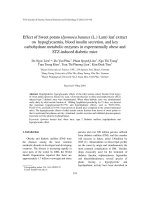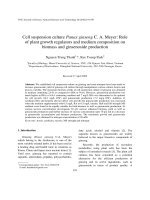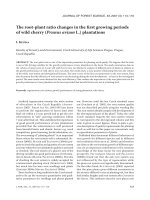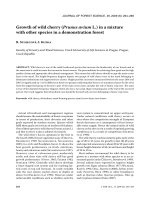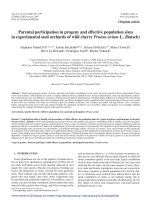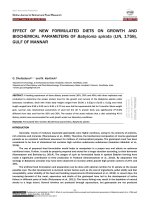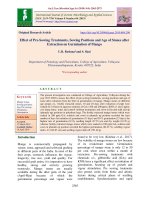Effect of growth regulators and chemicals on germination of Surinam cherry (Eugenia uniflora L.) seeds
Bạn đang xem bản rút gọn của tài liệu. Xem và tải ngay bản đầy đủ của tài liệu tại đây (167.58 KB, 6 trang )
Int.J.Curr.Microbiol.App.Sci (2018) 7(9): 546-551
International Journal of Current Microbiology and Applied Sciences
ISSN: 2319-7706 Volume 7 Number 09 (2018)
Journal homepage:
Original Research Article
/>
Effect of Growth Regulators and Chemicals on Germination of Surinam
Cherry (Eugenia uniflora L.) Seeds
S. Pavithra1*, G.S.K. Swamy2, G.J. Suresh3, Vishnuvardhana4,
S.V. Patil5 and G.K. Halesh6
1
Department of Fruit Science, College of Horticulture, Bengaluru, Karnataka, India
2
Department of Fruit Science, College of Horticulture, Myuru, Karnataka, India
3
Department of Postharvest Technology, College of Horticulture, Bengaluru, Karnataka, India
4
Department of Vegetable Science, College of Horticulture Bengaluru, Karnataka, India
5
Department of Agronomy, RHREC, UHS Campus, Bengaluru, Karnataka, India
6
Department of Biotechnology and Crop Improvement, College of Horticulture, Bengaluru,
Karnataka, India
*Corresponding author
ABSTRACT
Keywords
Surinam cherry,
Germination,
Survivability
Article Info
Accepted:
06 August 2018
Available Online:
10 September 2018
Experiment on effect of growth regulators and chemicals on germination of surinam cherry
(Eugenia uniflora L.) seeds was carried out in the college of Horticulture Mysuru during
the year 2017-18. The experiment was done with completely randomized design having
eight treatments with three replications. Among the different treatment seeds which were
water soaked over-night (T2) took minimum number of days for early germination (18.33
days), complete germination (43.00 days) and fifty per cent germination (25.00 days). GA 3
treatment at 500 ppm (T 4) for 30 minutes showed maximum germination percentage
(100.00 %), survivability percentage (87.50 %) and vegetative growth parameters like
seedling height, number of leaves and seedling girth at 60 and 120 days after transplanting.
Introduction
Surinam cherry (Eugenia uniflora L.)
commonly called as pitanga or Brazillian
cherry or pumpkin cherry. An underutilized
minor fruit crop having its own medicinal
value, belongs to family myrtaceae and native
of Surinam, South American country and
hence it got its name as a surinam cherry. In
temperate zones, the plant is grown in pots for
its attractive foliage and bright fruits. Pitanga
can be used as a live fence and ornamental
plant as it grow slowly; this species has dense
and compact leaves. Fruits are rich source of
vitamin-C (26.3 mg/100g) and Vitamin-A i.e.,
1200-2000 IU (Santos et al., 2010 and Lira et
al., 2007). They are an excellent addition to
fruit cups, salads, custard pudding, ice cream
and can be made into sauce or preserved
whole in syrup. They are often made into jam,
jelly, relish or pickles. Brazilians ferment the
juice into vinegar or wine and prepare distilled
liquor (Ferreira et al., 1987). This species has
also attracted the attention of the
546
Int.J.Curr.Microbiol.App.Sci (2018) 7(9): 546-551
pharmaceutical industry, since fruits are rich
in vitamins and antioxidants and also due to
properties like antinociceptive, hypothermic
effect, antidiabetic and antibacterial effect of
leaf extract (Fadeyi and Akpan, 1989).
Surinam cherry is commercially propagated
by seeds and vegetative methods like grafting.
To undertake propagation by vegetative
means, production of healthy and vigorous
rootstock is very important. Since the seeds
exhibit slow and less germination, pregermination treatments may enhance the
germination potential of surinam cherry seeds.
Hence the study was carried out to increase
the germination potential and survivability of
the seedlings with different chemicals and
growth regulators.
Materials and Methods
The present investigation was carried out in
college of Horticulture Mysuru during 201718. The experiment was laid out with
completely randomized design having eight
treatments viz. control (T1), water soaking
over-night (T2), GA3 250 ppm (T3), GA3 500
ppm (T4), thiourea one per cent (T5), KNO3
one per cent (T6) for 30 minutes, HCl 25 per
cent (T7) for 5 seconds and seeds soaked in 10
per cent vermiwash over-night (T8).
Seeds were sown during last week of October,
2017 in protrays under lab condition. Later 30
days after sowing seedlings were transplanted
to polybags of size 5×8” filled with potting
mixture. Watering was done immediately after
transplanting and weeding was done as and
when required.
Observation like number of days taken for
initiation
of
germination,
complete
germination and per cent germination.
Seedling growth characters like seedling
height, number of leaves and girth of the
seedling were recorded.
The data generated from study were subjected
to analysis by using standard method
suggested by Panse and Sukhatme (1985).
Results and Discussion
Germination behavior
Among the different treatments, seeds soaked
in water over-night took minimum number of
days for initiation of germination, fifty per
cent germination and complete germination
(18.00, 25.33 and 43.00 days, respectively)
while it took maximum number of days for
seeds treated with HCl 25 per cent for
initiation of germination and complete
germination (24.33 and 49.33 days
respectively) and seeds treated with
vermiwash took maximum (28.33) number of
days for fifty per cent germination (Table 1).
Soaking of seeds in water stimulates and
produces enzymes like amylase and lipase
which activate storage materials in seeds.
Rehydration causes early emergence since all
pre-germinative processes for germination had
already occurred in seed. The other possible
fact for better germination per cent by water
soaking may be that it stimulates series of
biochemical change in the seed that are
essential to initiate the emergence process like
break down dormancy, hydrolysis, metabolism
of growth inhibitors, imbibition and activation
of enzymes, as reported by Patil et al., (2018)
in jamun. Similar results were coincide with
the findings of Pandey and Singh (2000) in
guava and Zahang et al., (2015) in litchi.
Per cent germination and survivability
Per cent germination and survivability per cent
were maximum (100.00 and 87.50 %,
respectively) in seeds treated with GA3 500
ppm and 10 per cent vermiwash. Whereas, it
was lowest in seeds treated with HCl 25 per
cent i.e., 76.67 and 54.17 per cent,
respectively (Table 1).
547
Int.J.Curr.Microbiol.App.Sci (2018) 7(9): 546-551
The increase in germination percentage with
GA3 might be due to the fact that GA3
involved in the activation of cytological
enzymes which stimulates α-amylase enzyme
which convert insoluble starch into soluble
sugars or might have antagonized the effect of
inhibitors present in seeds thus helps in higher
germination(Hartman and Kester, 1997).
These results are close conformity with the
findings of Kalyani et al., (2014) in guava.
Barman et al., (2016) reported that jamun
seeds treated with GA3 100 ppm shown
maximum percentage of germination. This
may be due to GA3 helps in accelerating seed
germination, increasing seedling vigour and
improving physiological status of the plant.
GA3 induces maximum seed germination due
to the diffusion of endogenous auxin and
gibberellins like substances, as reported by
Pawshe et al., (1997) in aonla. Maximum
survival percentage was observed in the
treatment (T4) seeds treated with GA3 500
ppm. This might be due to that quicker root
and shoot development and making the
seedling
stouter,
withstanding
the
transplanting shock and resisting root diseases.
The result is conformity with the findings of
Palepad et al., (2017) in custard apple, Kumar
et al., (1997) in guava and Gurung et al.,
(2014) in passion fruit.
Table.1 Effect of chemicals and growth regulators on germination characters of
Surinam cherry seeds
Days taken for
Treatments
Germination Survivability
percentage
percentage
(%)
(%)
Initiation of
germination
Complete
germination
Fifty per cent
germination
T1 (Control)
22.00
47.67
27.30
86.67
(68.85) *
54.17
(47.41) *
T2 (Water
soaking)
18.33
43.00
25.00
96.67
(83.46)
66.67
(54.83)
T3 (GA3 250
ppm)
19.33
44.67
25.67
96.67
(83.46)
83.33
(66.20)
T4 (GA3 500
ppm)
19.00
44.00
26.00
100.00
(89.41)
87.50
(69.20)
T5 (Thiourea 1
%)
19.33
47.33
27.67
90.00
(71.56)
75.00
(60.51)
T6 (KNO3 1
%)
19.67
46.00
27.67
96.67
(83.46)
79.17
(63.09)
T7 (HCl 25 %)
24.33
49.33
26.33
76.67
(61.22)
54.17
(47.42)
T8 (Vermiwash
10 %)
20.67
45.67
28.33
100.00
(89.41)
87.50
(69.29)
S.Em ±
00.35
0.44
0.58
02.63
04.17
C.D @ 5%
01.07
01.33
01.74
07.97
12.61
* Values in parenthesis are arc sin transformation data
548
Int.J.Curr.Microbiol.App.Sci (2018) 7(9): 546-551
Table.2 Effect of chemicals and growth regulators on growth parameters of surinam cherry seeds
Treatments
T1 (Control)
T2 (Water soaking)
T3 (GA3 250 ppm)
T4 (GA3 500 ppm)
T5 (Thiourea 1 %)
T6 (KNO3 1 %)
T7 (HCl 25 %)
T8 (Vermiwash 10 %)
S.Em ±
C.D @ 5%
Seedling height (cm)
60 DAT
120 DAT
6.67
08.87
7.73
09.37
8.19
12.02
8.76
13.67
6.97
10.01
7.09
11.02
6.31
07.85
7.56
11.40
0.13
00.20
0.38
00.60
Number of leaves
60 DAT
120 DAT
09.40
16.47
09.87
18.00
10.73
23.67
12.07
24.00
09.47
15.93
09.60
19.27
08.20
13.60
10.07
22.33
00.35
00.58
01.07
01.75
Seedling girth (mm)
60 DAT
120 DAT
0.92
1.27
1.23
1.69
1.27
2.07
1.35
2.17
1.09
1.62
1.11
1.58
0.90
1.24
1.27
1.94
0.027
0.03
0.085
0.11
DAT- Days After Transplanting
HCl 25 per cent (T7) i.e., 8.20 and 13.60,
respectively (Table 2). This might be due to
maximum height of seedlings resulted in
more number of leaves. This also helps in
invigoration of physiological process of plant
and stimulatory effect of chemicals to form
new leaves at faster rate. Activity of GA3 at
the apical meristem resulting in more
synthesis of nucleoprotein responsible for
increasing leaf initiation and area as reported
by Palepad et al., (2017) in custard apple.
Seedling growth parameters
Seedling height
Seeds treated with GA3 500 ppm (T4) showed
significantly maximum values for seedling
height at 60 and 120 days after transplanting
i.e., 8.76 and 13.67 cm, respectively.
Whereas, minimum values for the same was
noticed in HCl 25 per cent (T7) i.e., 6.31 and
7.85 cm, respectively (Table 2). The increased
seedling height with GA3 treatment was due
to the fact that this hormone increased
osmotic uptake of nutrients, causing cell
multiplication and cell elongation in the
cambium tissue of the internodal region and
thus increased height of the plant, as reported
by Patil et al., (2018) in jamun. The results
are also in accordance with result of
Harshavardhan and Rajasekhar (2012) in
jackfruit.
It may also due to that GA3 which induced
vigorous growth by more number of branches
which in turn facilitates better harvest of
sunshine by the plants to produce more
number of leaves as reported by Patil et al.,
(2018) in jamun. This is in line with the
results of Shaban (2010) in mango and
Kadam et al., (2010) in Kagzi lime.
Seedling girth
Number of leaves
Seeds treated with GA3 500 ppm (T4) showed
significantly maximum values for girth of the
seedling at 60 and 120 days after
transplanting i.e., 1.35 and 2.17 mm,
respectively. Whereas, minimum values for
the same was noticed in HCl 25 per cent (T7)
Seeds treated with GA3 500 ppm (T4) showed
significantly maximum values for number of
leaves at 60 and 120 days after transplanting
i.e., 12.07 and 24.00, respectively. Whereas,
minimum values for the same was noticed in
549
Int.J.Curr.Microbiol.App.Sci (2018) 7(9): 546-551
i.e., 0.9 and 1.24 mm, respectively (Table 2).
This might be due to greater cell division and
elongation at the stem portion leads to
increased photosynthetic activity, accelerated
translocation and efficiency of utilizing
photosynthetic products resulting in cell
elongation and rapid cell division in growing
portion. GA application may be attributed to
the cell multiplication and elongation in the
cambium tissue in custard apple (Palepad et
al., 2017). The results obtained in the present
investigation are in close conformity with the
results of Kadam et al., (2010) in kagzi lime,
Gurung et al., (2014) in passion fruit, Barman
et al., (2016) and Patil et al., (2018) in jamun.
passion fruit (Passiflora edulis Sims.).
Int. Quarterly J. Life Sci. 9(1): 155-157.
Harshavardhan, A. and Rajasekhar, M., 2012,
Effect of pre-sowing seed treatments on
seedling growth of jackfruit (Artocarpus
heterophyllus Lam.). J. Res. ANGRU.
40(4): 87-89.
Hartman, H. T. and Kester, E., 1997, Plant
propagation principles and practices.
Prentice Hall of India Pvt. Ltd., New
Delhi. pp: 130-144.
Kadama, A. B., Singh, D. B. and Kade, R. A.,
2010, Effect of plant growth regulators
and potassium nitrate on growth of
seedling of kagzi lime. Asian J. Hort.
5(2): 431-434.
Kalyani, M., Bharad, S. G. and Parameshwar,
P., 2014, Effect of growth regulators on
seed germination in guava. Int. J. Biol.
Sci. 5(1): 81-91.
Kumar, C. S., Palaniswamy, V., Jayaraj, T.
and Arumugam, R., 1997, Studies on
certain seed tecnological aspects in
guava (Psidium guajava L.). South
Indian Hort. 39:315-316.
Lira, J. J. S. D., Bezerra, J. E. F., Lederman, I.
E. and Silva J. J. F. D., 2007, Surinam
cherry. Recife. Pernambuco Agril. Res.
pp: 1-87.
Palepad, K. B., Bharad, S. G. and Bansode, G.
S., 2017, Effect of seed treatments on
germination, seedling vigour and
growth rate of custard apple (Annona
squamosa.). J. Pharmaco Phytochem.
6(5): 20-23.
Pandey, D. and Singh, H. P., 2000, Effect of
seed pre-treatment on promotion of
germination in guava. Ann. Agric. Res.
21: 279-281.
Panse, V. G. and Sukhatme, P. V., 1985,
Statistical methods for agricultural
workers. ICAR New Delhi. pp: 381.
Patil, H., Tank, R. V., Bennurmath, P. and
Patel, M., 2018, Effect of seed treatment
on germination and seedling growth of
Seeds which were water soaked overnight
results in early and complete germination,
however,
germination
percentage,
survivability percentage and seedling growth
parameters were recorded maximum in GA3
treated seeds.
References
Barman, P., Rekha, A. and Paneerselvan, P.,
2016, Effect of different doses of
gibberellic acid and benzyl adenine on
germination and morpho-physiological
characters in jamun (Syzygium cumini
Skeels.) under different propagation
substrates. J. Farm Sci. 29(1): 140-142.
Fadeyi, M. O. and Akpan, U. E., 1989,
Antibacterial activities of the leaf
extracts of Eugenia uniflora L.
Phytotherpy Res. 3(4): 154-155.
Ferreira, F. R., Ferreira, S. A. N. and
Carvalho, J. E. U., 1987, Fruit species
unexplored, with economic and social
potential for Brazil. J. Fruit Growing. 9:
11-22.
Gurung, N., Swamy, G. S. K., Sarkar, S. K.
and Ubale, N. B., 2014, Effect of
chemicals and growth regulators on
germination, vigour and growth of
550
Int.J.Curr.Microbiol.App.Sci (2018) 7(9): 546-551
jamun (Syzygium cumini). Int. J. Curr.
microbiol. Appl. Sci. 7(2): 2654-2659.
Pawshe, Y. H., Patil, N. B. and Patil, L. P.,
1997, Effect of pre-germination seed
treatment on germination and vigour of
seedlings in aonla (Emblica officinalis
Garten.). PKV Res. J. 21(2): 152-154.
Santos, A. K. L., Costa, J. G. M., Menzes, I.
R. A., Cansancao, I. F., Santos, K. K.
A., Matias, E. F. F. and Coutinho, D.
M., 2010, Antioxidant activity of five
Brazilian plants used as traditional
medicines and food in Brazil.
Pharmacogn. Mag. 6(24): 335-338.
Shaban, A. E. A., 2010, Improving seed
germination and seedling growth of
some mango rootstocks. AmericanEuropean J. Agric. and Environ. Sci.,
7(5): 535-541.
Zhang, C., Jiefang, W., Danwen, F., Wang,
L., Chen, J., Cai, C. and Liangxi, O.,
2015, Soaking, temperature, and seed
placement affect seed germination and
seedling emergence of Litchi chinensis.
Hort. Sci. 50(4): 628–63.
How to cite this article:
Pavithra, S., G.S.K. Swamy, G.J. Suresh, Vishnuvardhana, S.V. Patil and Halesh, G.K. 2018.
Effect of Growth Regulators and Chemicals on Germination of Surinam Cherry (Eugenia
uniflora L.) Seeds. Int.J.Curr.Microbiol.App.Sci. 7(09): 546-551.
doi: />
551
